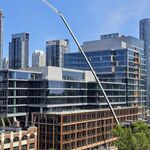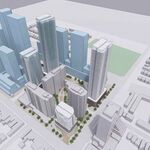From the Star:
License suburban rooming houses, Moscoe says
Feb 05, 2008 03:32 PM
donovan vincent
city hall bureau
Rooming houses in North York and Scarborough should be licensed to help prevent cases like the illegal 18-bedroom property that operated in Scarborough, says the head of Toronto's licensing and standards committee.
Councillor Howard Moscoe described Monday's Toronto Star story about am 18-bedroom Scarborough home being used as an illegal rooming house as "outrageous.'' Licensing rooming houses – as is in done in downtown Toronto – could enable the city to set limits on things like the number of units per home, parking standards and the minimum amount of space per person, he says.
Four or five units per rooming house could perhaps be one of the standards, Moscoe said Tuesday.
Moscoe says he proposed the idea of licensing suburban rooming houses a few years ago, but met with resistance from other councillors.
He said Tuesday that he might revive the idea and bring it to members of his licensing and standards committee sometime soon.
Lushan Lu, the owner of the illegal east-end rooming house, subdivided his large Scarborough home a few years ago, creating 18 bedrooms and eight bathrooms.
Now he's returning it to its original form.
That comes after he pleaded guilty in court this summer to city zoning bylaw infractions. He and co-owner Zhuan "May" Wang were each fined $5,000.
Tenants in the home on New Forest Square, in the Kennedy Rd. and Steeles Ave. E. area, were paying $400 a month rent.
If Lu and Wang had just one person per room in their house they would collect more than $7,000 each month.
The case marked one of two successful prosecutions by the city this past summer of illegal rooming house operators.
The other, Run Ying "Lucy" Wang, was fined $72,000 for zoning violations relating to two homes in her name on nearby Shepton Way.
The cases reveal the suburban spin on what is often seen as a downtown problem.
And city officials say there are hundreds of illegal rooming houses run by landlords exploiting people desperate for affordable housing.
Lu's property, which city officials say was being run like a hotel, was advertised on the Internet. The website offered potential tenants, mostly new immigrants to Canada, a ride from Pearson airport in a van, though Lu insists many made their own way to the house.
What's surprising is that Lu's property looks like any other suburban home. The nondescript, two-storey, red-brick house boasts a two-door garage and a large pine tree dominates the front yard.
While the Star could not gain access to the house, it is hard to imagine 18 rooms crammed into the residence.
And it's no easy matter for officials to stop landlords operating outside the law.
Toronto officials with Municipal Licensing and Standards, the fire department and city councillors in North York and Scarborough are using the fire code and property standards rules to close hundreds of illegal rooming houses operating in those two communities.
However, it's a slow process.
An illegal suburban rooming house is typically in large, expensive homes, and the landlords are making big bucks off the backs of desperate tenants. The operators rarely flinch when ordered to pay fines because they're making so much money, city councillors say.
"These illegal rooming houses aren't just a blight on the neighbourhoods, they're exploiting the people who live in them," North York councillor John Filion (Ward 23, Willowdale) says.
In downtown Toronto, the victims of illegal rooming houses are often long-time residents who are homeless or trying to escape that lifestyle.
The Star recently profiled a property on Queen St. W., which earned the nickname "the Dungeon."
Though it wasn't a rooming house, the conditions were deplorable, and city officials condemned the basement, where they found a number of men living among live and dead mice, and human feces.
But unlike those tenants, the residents in illegal suburban rooming houses are typically foreign students, or new immigrants to Canada seeking a better life.
"I think it (illegal housing) is an issue all over the place. It just manifests itself differently in different parts of the city," Filion adds.
The problem has popped up in the 905 region, too.
In June a home in Markham caught fire, killing landlord Roberto "Ali" Valdini. Before his death he'd been to court repeatedly since September 2006, answering to fire code violations.
The home, on Steeles Ave. E. near Yonge St., is in an area zoned for single-family homes, but it had been subdivided into 11 units.
Markham Fire Department's acting deputy chief Glenn Dick says electrical problems are suspected as the cause, though the office of the Ontario Fire Marshal is still investigating.
Illegal rooming houses are potential fire hazards because they have numerous self-contained units and therefore more tenants using electricity to power things like computers and hot plates in their rooms. That can overload circuits, and cause a fire, Dick says.
Rooming houses are licensed and regulated in Toronto, but preamalgamation rules prohibiting them remain in force in North York and Scarborough.
Toronto's public health department licenses lodging houses in Etobicoke.
Lu, a software developer who ran unsuccessfully as a city councillor in Scarborough in the 2006 municipal election, was reticent to talk about his rooming house.
The married father of two says he bought the home around 2002 and subdivided it sometime a few years later. He rented out rooms because his wife doesn't work.
In addition to that property he has another house a few doors down, in which he now lives with his family.
Lu says he learned the first property was illegal after consulting city documents on his own. The city got wind of this house after receiving a complaint.
City officials spoke to him several times, says Bill Blakes, a district manager for the Municipal Licensing and Standards office in Scarborough, and Lu got a warning letter in June 2004.
Licensing and standards investigators made several requests to enter the property during their probe, but were rebuffed before the owner finally agreed.
In June 2006 investigators determined the property was a rooming house, which legally is defined as: A living accommodation being rented by more than two persons who aren't members of a single family that would normally occupy the dwelling.
Obtaining a search warrant to enter suspected rooming houses is no easy feat, says Lance Cumberbatch, director of investigations for Toronto's municipal licensing division.
"We have to persuade a justice of the peace. We might see a lot of cars or a lot of garbage being put out, but in the past that's not been enough," Cumberbatch says.
So often it's up to the owner to grant entry.
AoD




